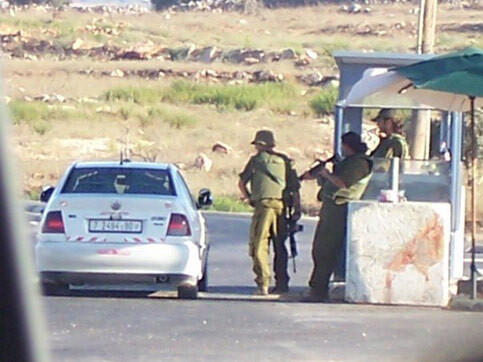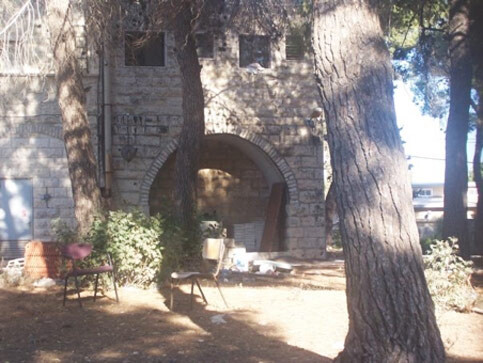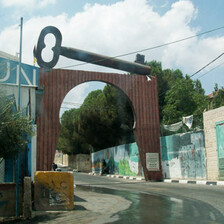Deir Yassin 9 September 2008

Israeli soldiers stop a Palestinian car at a checkpoint in the occupied West Bank.
Ten kilometers outside of Jerusalem sits a forgotten town. Ten kilometers outside the Old City awaits a hidden piece of land I grew up hearing tales of. Ten kilometers outside — far enough so the fragrant smell of dates, spices, harissa, the ubiquitous sweet dripping in syrup, and the aromatic smell of cinnamon from the baklava fresh out of the oven, is no longer discernible — sits Givat Shaul.
Givat Shaul, they called it, a name whose very sight now elicits a feeling that forever carries with it an expiration date, much like that of a carton of old milk. Givat Shaul, a blatant reminder of the theft, the incursion, the loss of innocence six decades ago. Givat Shaul, a shameless aide memoire of history in its every sinister sense of the word, of pillaging, of inoperable wounds that time could never erase. Givat Shaul, in all its gray desolateness, epitomizes the added insult to injury endured for what seems like an
eternity now.
Strategically covered in identical homes, lacking a single ounce of character, resembling those of your childhood Monopoly game but with nowhere near the innocence, it sits on edge somehow knowing its presence would never be permanent, that in time things would be vastly different. Time would only tell.
I made a mental checklist that Saturday morning of all the things that would guide me and prepared to embark on my journey back in time: a silver Chevy Cavalier, with yellow Israeli plates, and a full tank of gas on the gravel road outside ready to start the journey; my American passport tucked into my bag, ready to wave at the pre-pubescent soldier waving me to pull over; camera in hand, I was ready to document history with one click and a flash. All I had left to do was to pack away my inhibition and fasten my seat belt.
After 20 minutes of waiting in line at the Qalandiya checkpoint, buying three packs of gum from young boys who had come to know this as a living, I was told to pull up. “Open the trunk,” the soldier instructed me, pounding twice on the hood of the car. She couldn’t have been much older than me, but somehow, I felt quite juvenile standing next to her with her machine gun strapped across her chest and sniffer dog eying me angrily. Those three minutes seemed like the longest three minutes of my existence thus far. She checked the trunk, eyed my T-shirt and blue jeans with disgust, and told me to get back into the car. I considered myself lucky. My modesty wasn’t apathetically stripped and displayed for all to see with the order to raise my shirt and turn around three times like a circus act to prove I wasn’t smuggling anything more than some excess weight that had taken up residence in my gut. Women hadn’t been subjected to such humiliation just yet, but it was only a matter of time before this too was implemented.
I stood there for a minute waiting for her to hand me back my passport, but I suppose I was being sadly naive and optimistic. “In the car,” she snapped. She walked away toward her post. This deliberate waste of time is intended to make you stew. In the eyes of the complacent soldiers, fresh out of high school, you were insignificant, you are nothing, merely a number, so sit down, shut up, and wait to be addressed. So I sat there, tapping my finger on the steering wheel, not knowing whether to laugh or curse. I thought, “Take your time, take all the time you need. Look over my stamped visas, infer that despite my American passport, the ‘El’ of my name was a subtle reminder of the essence of my true being.”
The young soldier, along with her horde of equally incompetent-looking soldiers all took turns flipping through the pages of my navy blue passport. All the while, I sat there, wondering if the one who had conspicuously read my passport upside down, had ever shot anyone with that gun he held on so tightly to. My disgust and cynicism had begun to surface on my face, but I reminded myself those kind of childish antics were not part of the plan. Stay calm and keep on your way. Before I could manage to come up with a smart comeback or to snap a picture of the blatant humiliation displayed, the soldier came swaggering back, passport in hand, and with a wave of her hand, sent me on my way. Swoosh, went her hand.
Alright, one checkpoint down, one more to go, and it only took me a little over half an hour. Good timing. Turning on the engine getting to ready to drive off, I couldn’t help but think about all my green plate counterparts, waiting to be let through. If it took me this long to get through, how long would it take them?
Passing the settlement to my left, a sight that has become something of the ordinary, the drive seems to go into a slow-motion abstraction. Lifeless it just sat there, not a sign of existence anywhere to be found. The area was immaculate, aesthetically beautiful in every conventional sense of the word, but it was nothing I envied. Where I come from, they sing songs in the marketplace to sell their watermelon, old men greet you with Turkish coffee and loud jubilees, and the smell of baked pita bread lingers through triumphant crowds. Where I come from, despite occupation and misery, they live.
Past perfectly sculpted landscapes, I make my way to no man’s land. Past the walls of Jerusalem’s Old City, reminiscent of medieval castles from fairy tales of long ago and the chivalrous battles of Salah al-Din, past Mt. Zion and the Church of St. Mary Magdalene with all its golden glory, lies my forgotten piece of earth, hidden away in solitude, shielded from the animosity of the outside world.
Past the synagogue at the foot of the hill, I make my way around to where time seems to have stood still. Just around the corner, I know waiting for me are four brick walls that have stood the test of time, frozen in this time, frozen by the sights they’ve witnessed not too long ago. A barbed wire fence now encloses my time warp, and getting close to it makes it all too real. At this very spot, I imagine the little girl and her siblings playing lighthearted games of tag and dolls, while her mother sat and washed laundry on her washing board. Playing and frolicking, unaware that their entire world was about to change, and this place they had come to call home would be nothing more. It would be belong to someone else, no apologies warranted, no explanation necessary. And at this very spot, innocence was taken too prematurely.
My grandmother’s house, the site of a massacre that destroyed virtue and life, was no longer a figment of my imagination, but tangible, albeit a bit surreal and forgotten. The stones of her house stood there untouched, as if time had really been frozen all this time. As if this house, this very site that allowed for the conception of a malevolent demon that has haunted us for 60 long years, was meant to remain timeless.

The author’s grandmother’s house in Deir Yassin.
Standing there made all her stories come to life. They had come to life in the most uncomplicated way, and it brought me such a reassuring feeling. Deir Yassin, no longer just a story that she’d tell us to remind us of our catastrophe, no longer just a place I had to picture just to fill a void in my imagination. It was real, and it had stood there solemn and desolate, beautiful in all its abandoned splendor. Now, Givat Shaul seemed nothing more than a temporary name, a fabrication of time and history. After reading a prayer for my family long gone now, for all those who had lost their lives too young at this very spot, I recollected my composure and got back in the car, ready to head back to Ramallah. This wouldn’t be my last time, that I was sure of.
As I drove away from the old stone house, past the generic, lackluster cubicle boxes of the settlements stacked on top of one another, I found myself filled with a warm sense of hope that I needed to find on my own. This facade couldn’t last forever. For 60 years, the house stood there unscathed and eternal, just waiting to be rescued. I knew it wasn’t going anywhere. It would wait, just as it had been waiting, and until it was liberated from its heartache, I would visit to hear its warm whispers. I would wait for it, just as it had waited for me.
Driving home, Fadel Shaker’s “Ya Ghayeb” played solemnly on the radio, and I found it so incredibly fitting. Ya Ghayeb, the one who is far. I didn’t want to be far away anymore. That’s when I realized where my old soul had been hiding out for so long. I didn’t say goodbye, but rather so long. I would be back again.
Getting close to the checkpoint, I didn’t bother lowering the volume or acting like I had done too many times before. No more would I pacify the situation and blend in. I couldn’t even if I tried. With an indifferent wave of my passport, I drove on by back toward the organized chaos of Ramallah, back where resilience never slept, didn’t know the meaning of it. Back to where the streets weren’t polished or immaculate, but full of life which made them beautiful in their own way.
Sometimes, it takes traveling halfway across the world to appreciate real beauty for what it’s worth. It may take some winds and turns, many uphill maneuvers, and a few bumpy roads to make you truly realize that beauty is oftentimes hidden, that the most beautiful things in life are the ones that aren’t quite within reach, the ones that stand the test of time through heartache and struggle and emerge timeless as ever. It took me 6,202 miles, 20 years, and a dose of reality to get me there, but I made it. And I can’t wait to go back.
All images by Dina Elmuti.
Dina Elmuti is a senior at the University of Illinois, majoring in Molecular Biology. She hopes to go to medical school and then practice Palestine.





